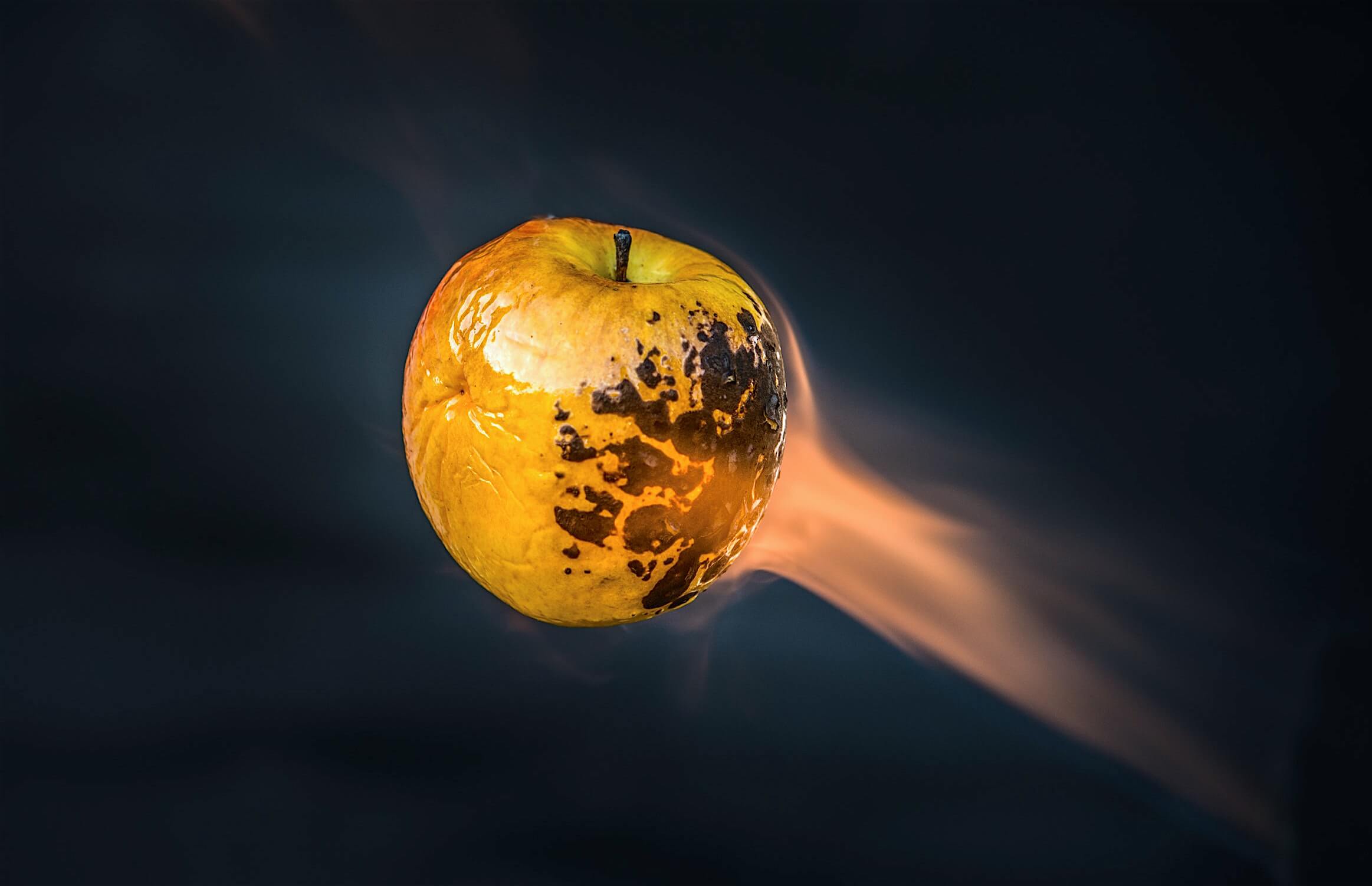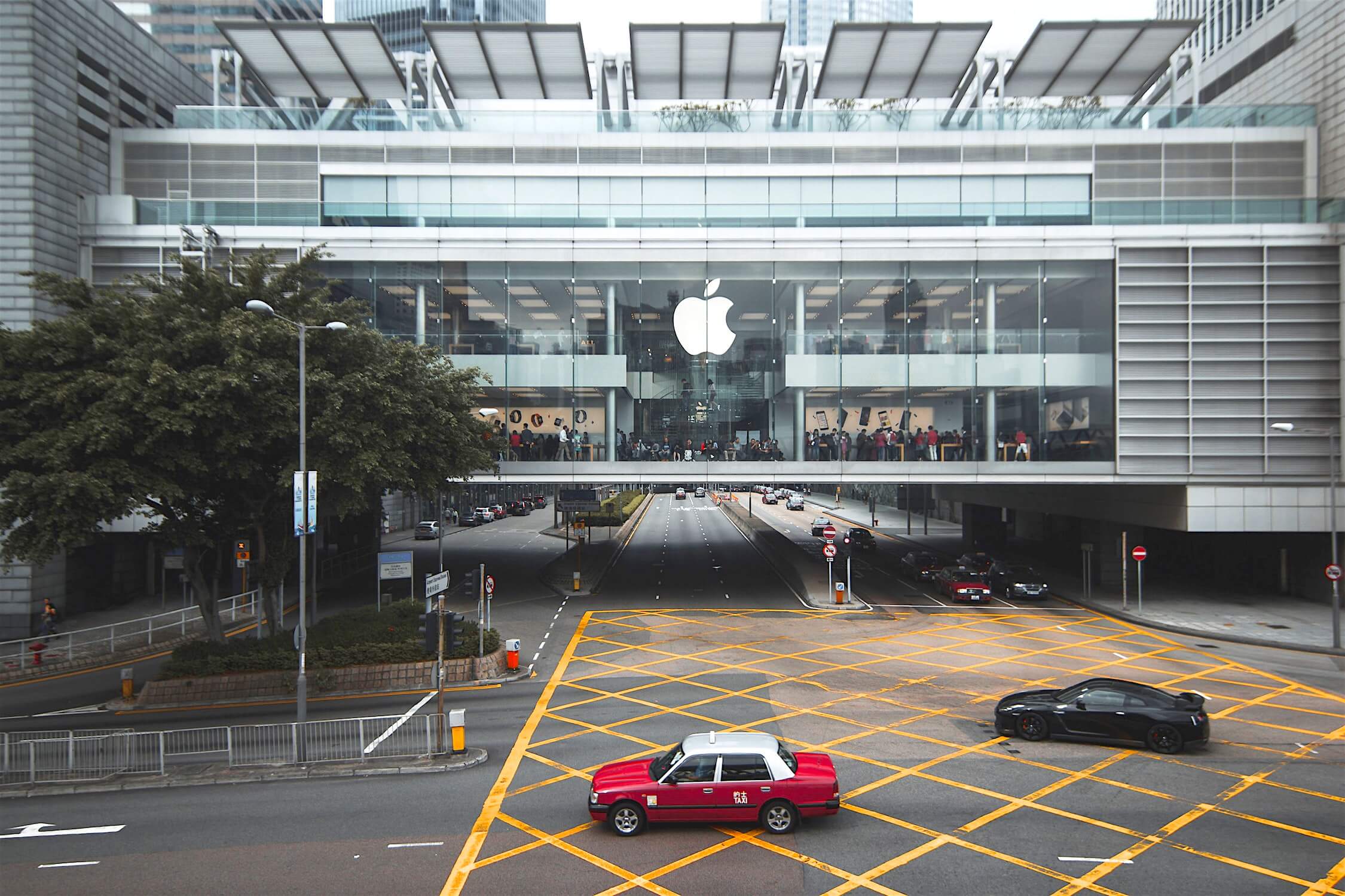How did an IT company fight for the right to sell music
In 2001, Apple introduced iTunes. It was the first musical product of the company - at that time there were no iPods, or a store of the same name. In order to advertise the player’s capabilities, for some time after the release of iTunes, new Apple computers came with a selection of songs. Such a move looks quite prosaic.
In the end, other companies of the time did the same thing - we already wrote about the music that came with Windows . But for Apple, this was a truly bold decision with real risks. The fact is that in 1981 the company promised not to touch the music market. And twenty years later, in front of everyone, broke her promise .

Olivier Miche Unspalsh Photos
')
Music lovers know that in the music industry with branding is not joking. A considerable number of groups had to change their name in order not to “get” onto an existing trademark. So Dust Brothers became known under the name Chemical Brothers , The Prodigy got a definite article in the title, and numerous other groups simply added the country of origin to their name.
Therefore, when Apple Jobs and Wozniak reached their first successes in the late 70s, they were noticed by other Apple with an apple on the logo - a media conglomerate founded by members of The Beatles. Apple Corps . appeared ten years earlier in order to unite all kinds of business projects of The Beatles members. On the label "Apple Records" released albums of the group, and subsequently its former members. Apple Films has produced music and feature films. Apple Electronics unsuccessfully tried to break into the gadget market. Under the brand "Apple" even existed a boutique in the center of London.
It is not surprising that soon after the appearance of the American namesake, litigation began, “dividing” the sphere of influence of the two companies. Britons Apple Corps. reserved the right to work in the entertainment industry, and Apple Computer promised not to touch the music. Also Apple Corps. awarded damages in the amount of 80 thousand dollars.
But the truce did not last long.
The first violation of the contract by the American Apple happened in 1986, when the Ensoniq sound chip appeared in the Apple IIGS . The British considered MIDI-functional new computers an attempt on their territory. Their lawyers were hit by the entire Mac lineup and even the company's CD-drive, as products capable of playing and producing music.
At the same time, the active development of the new version of Mac OS was carried out. In the American Apple, the British took the claims seriously and tried to exclude any musical allusions.
In October 1991, five years after the start of the trial, the parties reached a new agreement, according to which, Apple Computer was forced to pay Apple Corps $ 26.5 million for violating the previous agreement. Americans have earned the right to sell products that are indirectly related to music, including devices and programs for its creation and reproduction. But the right to distribute "creative work of a musical nature" under the appropriate trademark remains with the British.
Which brings us to the situation with which this article began. Outside the beginning of zero, and Apple has ambitious plans to seize the music market. In 2001, iTunes was released - a player for MacOS. In order to advertise the product, a sampler of 40 songs was delivered with new poppies - from The B-52's “pop” to Infected Mushroom. It can be assumed that the connection of the product with music is “mediated” - music is not for sale, but attached as a gift.
But Apple is already entering dangerous territory.

Raquel Martínez Unspalsh Photo
In the autumn of the same year iPod comes out. Journalists are handed out copies of the product with pre-loaded albums . There are even two Beatles albums among them, but since there is no commercial element at all here, the British have nothing to cling to. When the iTunes Store was launched two years later and Apple began distributing and selling music, Apple Corps lawyers. once again rolled up their sleeves and went to court.
Apple Computer argued that the agreement reached in 1991 could be violated by the company only if its products were shipped with music CDs. While the songs are distributed through a virtual store, Apple is only an intermediary, the creator of software for sales. Another argument was cited against the company - while the British were actively looking for partners for digital distribution.
In the case of a successful transaction between Apple Corps. and a distributor, the Apple iTunes brand would infringe on the territory rightfully owned by Apple Corps.
The press had expected that, as in the previous disputes, the parties would reach an amicable settlement, not bringing the process to court. But this time the hopes were not justified. In May 2006, after three years of litigation, the British judge Anthony Mann (Apple Anthony Mann) recognized for Apple Computer the right to sell and distribute music until the company was directly involved in its creation. His interpretation of the 1991 treaty was consonant with the interpretation of Americans: as long as Apple Computer does not use the trademarks assigned to Apple Corps, they can run a music business.
Apple Corps appealed, but to no avail. The victory was won by the Americans.
After Apple officially got the right to go beyond the computer industry, the company changed its name to Apple Inc. In the same year, in order to avoid further litigation, Apple bought trademarks associated with Apple Corps. In a press release, Steve Jobs said : “We love the Beatles, and it hurts us to quarrel with them because of the brands. We are glad that we were able to positively resolve this conflict. ”

Photo by Alexandr Bormotin Unspalsh
Apple Corps. continue to use their trademarks - now under an exclusive license provided by Apple Inc. And in 2010, the entire catalog of the company became available on iTunes.
Partly because of this litigation, Mac OS is not so strongly associated with free music as Windows. Apple simply could not afford to risk so much. But they somehow conducted the experiments. Back in 2005, the company released two samplers available for download from the iTunes Store. In the past, we talked about music that was distributed to journalists. And it is worth noting that the contents of these samplers are not at all similar to what was on the first iPods .
The first sampler included the work of groups distributed by Atlantic and Lava Music companies such as Death Cab For Cutie and Porcupine Tree. At the second were the wards of Universal and Motown - including the Scissor Sisters and Acon.
But the most famous case associated with the free distribution of music, happened after the agreement between the two "apples". In 2014, to the delight of a small percentage of Apple users, a new U2 album was presented to all iTunes account holders. According to Wired magazine, this move was “worse than spam,” and in record time U2 itself became “the most hated group of America.” Apple had to create a special page with instructions for removing this album from its library.
By that time, new versions of Windows were no longer shipped with “trial” music. And Apple has also not done anything like that since. It is logical to assume that with the success of streaming services, we will no longer see such marketing moves. But for many people they will remain a subject for nostalgia.
 In “Audiomania” is the traditional summer sale Hot AUDIOSALE 2019 . Until the end of June, headphones, portable speakers, floor acoustics and tube amplifiers can be taken at a discount of up to 70% .
In “Audiomania” is the traditional summer sale Hot AUDIOSALE 2019 . Until the end of June, headphones, portable speakers, floor acoustics and tube amplifiers can be taken at a discount of up to 70% .
This is a good opportunity to get a gift for your family or to take a device that you have been looking for for a long time.
What else can you read in our "World Hi-Fi":
 What was on the first iPod: twenty albums that Steve Jobs chose in 2001
What was on the first iPod: twenty albums that Steve Jobs chose in 2001
 Why music is no longer recorded as before?
Why music is no longer recorded as before?
 Innovation SSI-2001: the story of one of the rarest sound cards for the IBM PC (and its replicas)
Innovation SSI-2001: the story of one of the rarest sound cards for the IBM PC (and its replicas)
 Enthusiast recreated the sound card Sound Blaster 1.0 - talk about the project
Enthusiast recreated the sound card Sound Blaster 1.0 - talk about the project
In the end, other companies of the time did the same thing - we already wrote about the music that came with Windows . But for Apple, this was a truly bold decision with real risks. The fact is that in 1981 the company promised not to touch the music market. And twenty years later, in front of everyone, broke her promise .

Olivier Miche Unspalsh Photos
')
The story of two Apple
Music lovers know that in the music industry with branding is not joking. A considerable number of groups had to change their name in order not to “get” onto an existing trademark. So Dust Brothers became known under the name Chemical Brothers , The Prodigy got a definite article in the title, and numerous other groups simply added the country of origin to their name.
Therefore, when Apple Jobs and Wozniak reached their first successes in the late 70s, they were noticed by other Apple with an apple on the logo - a media conglomerate founded by members of The Beatles. Apple Corps . appeared ten years earlier in order to unite all kinds of business projects of The Beatles members. On the label "Apple Records" released albums of the group, and subsequently its former members. Apple Films has produced music and feature films. Apple Electronics unsuccessfully tried to break into the gadget market. Under the brand "Apple" even existed a boutique in the center of London.
It is not surprising that soon after the appearance of the American namesake, litigation began, “dividing” the sphere of influence of the two companies. Britons Apple Corps. reserved the right to work in the entertainment industry, and Apple Computer promised not to touch the music. Also Apple Corps. awarded damages in the amount of 80 thousand dollars.
But the truce did not last long.
Tug of war
The first violation of the contract by the American Apple happened in 1986, when the Ensoniq sound chip appeared in the Apple IIGS . The British considered MIDI-functional new computers an attempt on their territory. Their lawyers were hit by the entire Mac lineup and even the company's CD-drive, as products capable of playing and producing music.
At the same time, the active development of the new version of Mac OS was carried out. In the American Apple, the British took the claims seriously and tried to exclude any musical allusions.
A curious story in this connection occurred with one of the system sounds — its author, audio engineer Jim Reekes, originally wanted to call it “beep”. Lawyers considered the name too musical, after which the audio designer jokingly suggested a more ironic version - “Let It Beep”.
Some of his colleagues took the joke seriously and tried to dissuade Jim, to which Jim replied: “I’m not serious, I'm like“ So sue me ”” (“I’m not serious, I want to tease them”, cont. “I am not serious, I just want to say to them:“ Well, sue me ””). It dawned on him - “So sue me” is a great name for a system sound, especially if you slightly distort the spelling.
So there was a sound called sosumi. The lawyers were told that this is a Japanese word, which literally means "completely unrelated to music." The name was approved, and after the release of the operating system it became legendary.
In October 1991, five years after the start of the trial, the parties reached a new agreement, according to which, Apple Computer was forced to pay Apple Corps $ 26.5 million for violating the previous agreement. Americans have earned the right to sell products that are indirectly related to music, including devices and programs for its creation and reproduction. But the right to distribute "creative work of a musical nature" under the appropriate trademark remains with the British.
Last battle
Which brings us to the situation with which this article began. Outside the beginning of zero, and Apple has ambitious plans to seize the music market. In 2001, iTunes was released - a player for MacOS. In order to advertise the product, a sampler of 40 songs was delivered with new poppies - from The B-52's “pop” to Infected Mushroom. It can be assumed that the connection of the product with music is “mediated” - music is not for sale, but attached as a gift.
But Apple is already entering dangerous territory.

Raquel Martínez Unspalsh Photo
In the autumn of the same year iPod comes out. Journalists are handed out copies of the product with pre-loaded albums . There are even two Beatles albums among them, but since there is no commercial element at all here, the British have nothing to cling to. When the iTunes Store was launched two years later and Apple began distributing and selling music, Apple Corps lawyers. once again rolled up their sleeves and went to court.
Apple Computer argued that the agreement reached in 1991 could be violated by the company only if its products were shipped with music CDs. While the songs are distributed through a virtual store, Apple is only an intermediary, the creator of software for sales. Another argument was cited against the company - while the British were actively looking for partners for digital distribution.
In the case of a successful transaction between Apple Corps. and a distributor, the Apple iTunes brand would infringe on the territory rightfully owned by Apple Corps.
The defeat of the "Beatles"
The press had expected that, as in the previous disputes, the parties would reach an amicable settlement, not bringing the process to court. But this time the hopes were not justified. In May 2006, after three years of litigation, the British judge Anthony Mann (Apple Anthony Mann) recognized for Apple Computer the right to sell and distribute music until the company was directly involved in its creation. His interpretation of the 1991 treaty was consonant with the interpretation of Americans: as long as Apple Computer does not use the trademarks assigned to Apple Corps, they can run a music business.
Apple Corps appealed, but to no avail. The victory was won by the Americans.
After Apple officially got the right to go beyond the computer industry, the company changed its name to Apple Inc. In the same year, in order to avoid further litigation, Apple bought trademarks associated with Apple Corps. In a press release, Steve Jobs said : “We love the Beatles, and it hurts us to quarrel with them because of the brands. We are glad that we were able to positively resolve this conflict. ”

Photo by Alexandr Bormotin Unspalsh
Apple Corps. continue to use their trademarks - now under an exclusive license provided by Apple Inc. And in 2010, the entire catalog of the company became available on iTunes.
Apple and free music
Partly because of this litigation, Mac OS is not so strongly associated with free music as Windows. Apple simply could not afford to risk so much. But they somehow conducted the experiments. Back in 2005, the company released two samplers available for download from the iTunes Store. In the past, we talked about music that was distributed to journalists. And it is worth noting that the contents of these samplers are not at all similar to what was on the first iPods .
The first sampler included the work of groups distributed by Atlantic and Lava Music companies such as Death Cab For Cutie and Porcupine Tree. At the second were the wards of Universal and Motown - including the Scissor Sisters and Acon.
But the most famous case associated with the free distribution of music, happened after the agreement between the two "apples". In 2014, to the delight of a small percentage of Apple users, a new U2 album was presented to all iTunes account holders. According to Wired magazine, this move was “worse than spam,” and in record time U2 itself became “the most hated group of America.” Apple had to create a special page with instructions for removing this album from its library.
By that time, new versions of Windows were no longer shipped with “trial” music. And Apple has also not done anything like that since. It is logical to assume that with the success of streaming services, we will no longer see such marketing moves. But for many people they will remain a subject for nostalgia.
 In “Audiomania” is the traditional summer sale Hot AUDIOSALE 2019 . Until the end of June, headphones, portable speakers, floor acoustics and tube amplifiers can be taken at a discount of up to 70% .
In “Audiomania” is the traditional summer sale Hot AUDIOSALE 2019 . Until the end of June, headphones, portable speakers, floor acoustics and tube amplifiers can be taken at a discount of up to 70% . This is a good opportunity to get a gift for your family or to take a device that you have been looking for for a long time.
What else can you read in our "World Hi-Fi":
 What was on the first iPod: twenty albums that Steve Jobs chose in 2001
What was on the first iPod: twenty albums that Steve Jobs chose in 2001  Why music is no longer recorded as before?
Why music is no longer recorded as before?  Innovation SSI-2001: the story of one of the rarest sound cards for the IBM PC (and its replicas)
Innovation SSI-2001: the story of one of the rarest sound cards for the IBM PC (and its replicas)  Enthusiast recreated the sound card Sound Blaster 1.0 - talk about the project
Enthusiast recreated the sound card Sound Blaster 1.0 - talk about the project Source: https://habr.com/ru/post/457236/
All Articles